The iPad Air Review
by Anand Lal Shimpi on October 29, 2013 9:00 PM ESTiPhone to iPad: CPU Changes
Although the iPad Air uses the same A7 from the iPhone 5s (and M7 motion coprocessor), there are a few minor differences that do lead to better performance.
At a high level we’re still talking about two 64-bit Apple Cyclone cores with 128KB L1s (64KB I$ + 64KB D$) per core, a shared 1MB L2 cache and a 4MB L3 cache that services the entire SoC. Apple increased CPU frequency from 1.3GHz to 1.4GHz in the iPad Air, a mild increase but in line with what we’ve seen from previous iPad designs. That’s the first impact on performance - a 7.69% increase in CPU frequency.
The second impact on performance is something I only noticed while digging around under the hood of the A7. It seems like the implementation in the iPad Air can, for whatever reason, hold more instructions in flight (over 20% more) than the A7 in the iPhone 5s. It’s unclear to me whether the A7 in the iPad is configured any differently via firmware/microcode or if perhaps we’re looking at a slightly different revision of the core, but the delta was repeatable in my testing.
The third, and likely biggest change impacting the iPad Air’s implementation of the A7 is the additional thermal headroom afforded by the larger chassis. I’m not going to go into details on exactly what this next test does (unfortunately we’re going to occlude some of the low level work that we do in light of all of the benchmark cheating going on), but we’re looking at a curve of performance vs. time for a particularly power heavy mix of code. We’re running the same exact code on both the iPad Air and iPhone 5s here, the only real difference is the size of the chassis:
You can see the 5s throttles back its CPU frequency to about 1GHz after the 2 minute mark. The crazy thing is that until that point the 5s manages to run at full frequency without so much as a hiccup for two full minutes, running an incredibly power hungry task. Given that most iOS apps aren’t this power intensive for such a sustained period of time, iPhone 5s users should almost always see the A7 running at a full 1.3GHz. Pretty crazy.
The iPad Air by comparison shows much more controlled behavior. Early on in the test we see a 7.7% performance advantage, which lines up perfectly with the iPad Air’s 7.7% CPU frequency advantage. By the end of the test the iPhone 5s has throttled to 900MHz, while the iPad Air drops to around 1.2GHz. At this point the iPad Air’s performance advantage grows to almost 40%.
CPU Performance
I've gone through our standard set of cross-platform browser based benchmarks to place the iPad Air's performance in perspective. As I mentioned in our 5s review, I don't know that there are many (any?) applications on iOS 7 that can really take advantage of all the A7 has to offer. There's definitely a ton of headroom left in the design. What's particularly exciting is when the A7 ends up in n-1 or n-2 iOS devices and it becomes the minimum developer target going forward.
I won't go through all of the results here again, but it's safe to say that the iPad Air is the fastest ARM based tablet on the planet at this point.
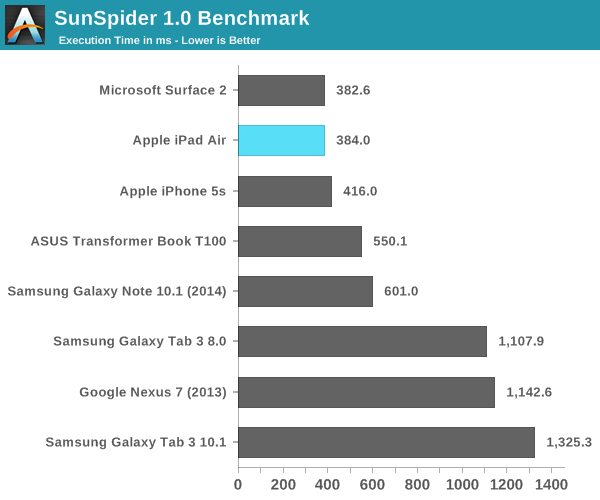
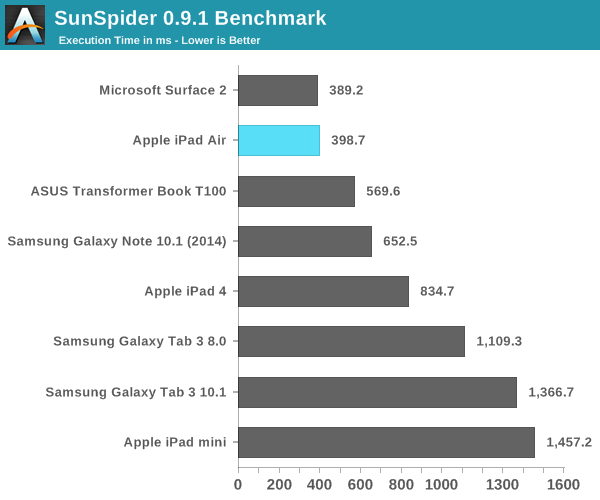
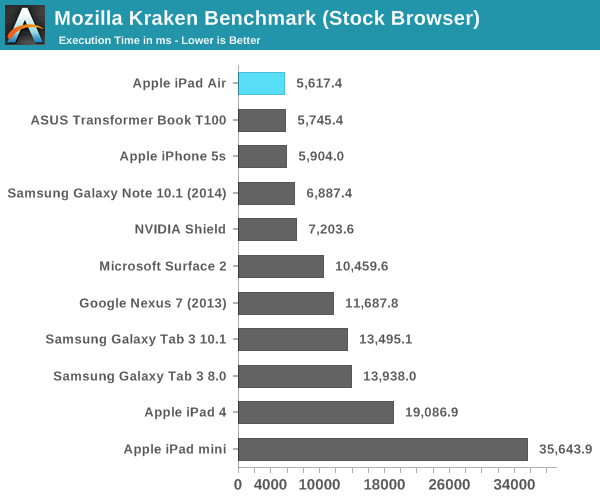
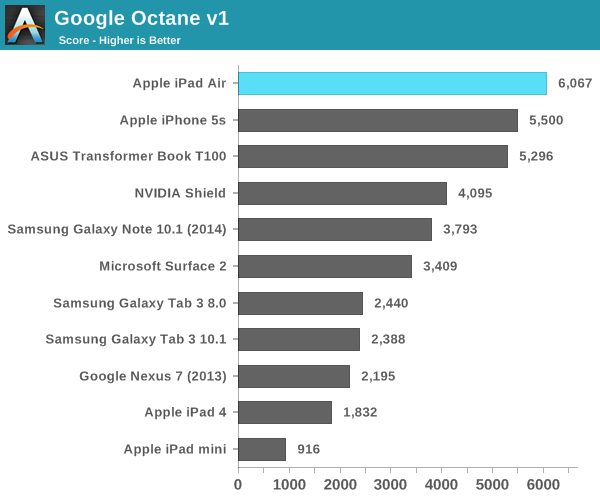
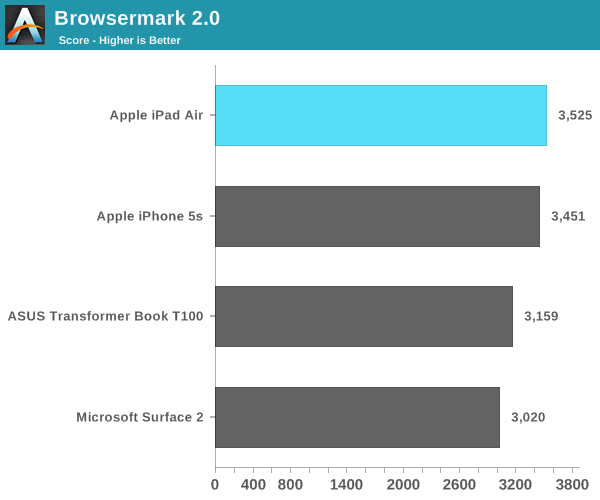
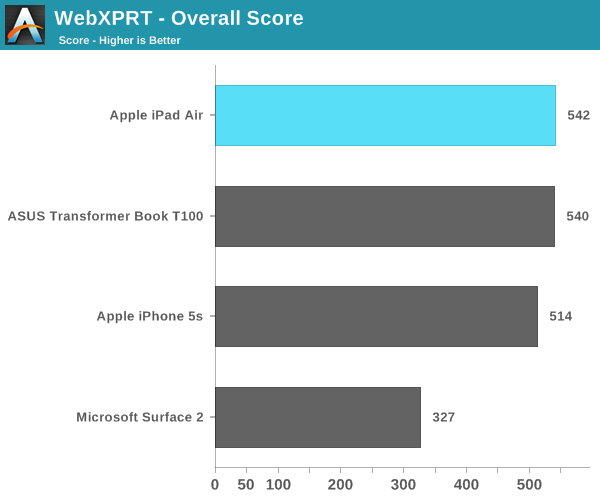
A7 Power Consumption
I’ll get to battery life in a bit, but I’ve been curious about the dynamic range of power consumption offered by Apple’s new A7 SoC. On the one hand we’re dealing with a lower power process (28nm vs. 32nm), but on the other hand Apple’s Cyclone cores can clearly draw more power given how beefy the architecture is this round. Apple frowns upon review sample dissection so I had to turn to a less scientific method of external platform level power measurement. The fidelity of the numbers here aren’t all that great but it’s better than nothing.
For the first test I measured platform power consumption during a Kraken run:
I purposely started measuring before the benchmark so I could get an idea of idle power consumption. The iPad Air consumes roughly 72% of the idle power as the iPad 4, both running at the same brightness. Here we’re not just seeing the A7’s advantages but also things like lower display power.
Focusing on the load portion of the measurement we see that both the new iPad and old iPad consume the same total power in this test. I suspect the A7 is drawing more power than the A6X, but it’s masked by a lower power display. Given how much faster the iPad Air is, Apple’s latest tablet features far lower overall task energy than the outgoing iPad 4. This is probably both the best case scenario for the iPad Air and the most likely case as well.
For kicks I wanted to see just how much power I could get the iPad Air to draw. Here I’m looking at platform power during our mini-power-virus test from above:
How’s that for dynamic range? Almost 12W running all out, but around half that in what we’d normally consider to be a stressful CPU test. I couldn’t get any actual applications/games on the iPad Air to behave like this so the results above are purely academic (for now). A quick run through GFXBench 2.7’s T-Rex HD test confirms that even pushing the GPU won’t hit these numbers. The max I saw running T-Rex offscreen was ~6W, and turning to an actual game (Infinity Blade 3) the iPad Air pulls less than 5W.


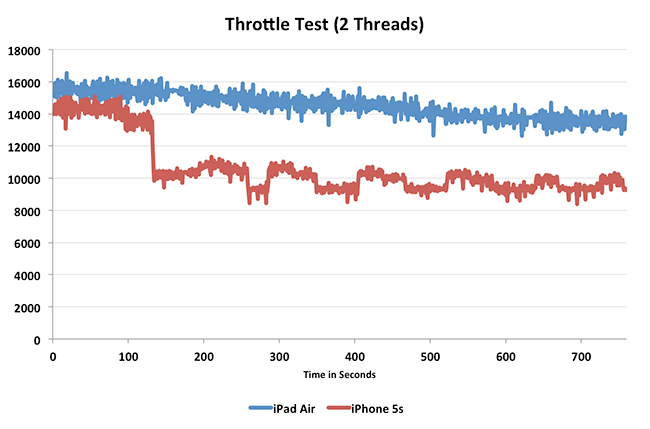
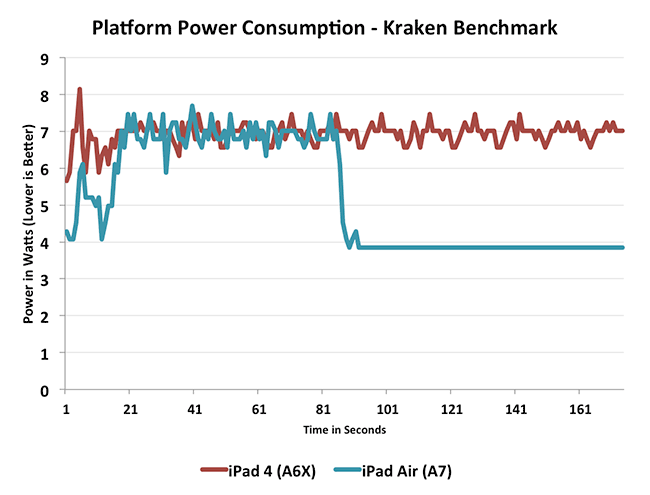
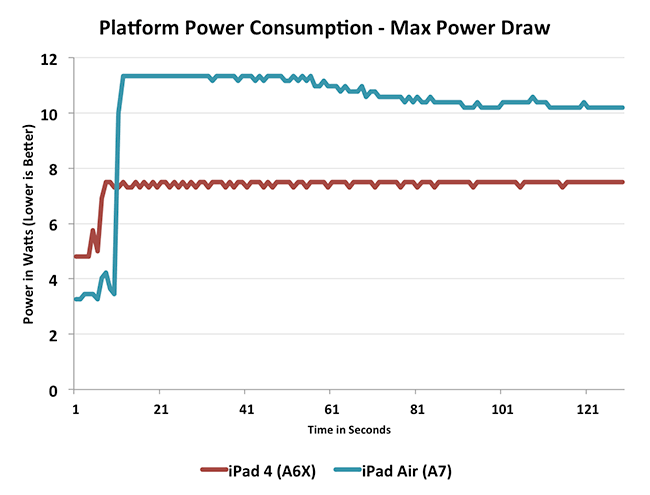








444 Comments
View All Comments
dishayu - Wednesday, October 30, 2013 - link
I agree on one tiny point with you. The shortcomings of a device need to be highlighted when it comes out... NOT when the successor is launched. And I've read AnandTech long enough to know that this is not just a problem with Apple reviews. This is the problem with all reviews... Android, PC and storage reviews and so on... As soon as a refresh/next gen product is launched, the previous gen suddenly develops issues/shortcomings. Don't get me wrong, their reviews are still the best and more in-depth than rest of the internet combined, but they seriously need to address this little issue.BlakKW - Wednesday, October 30, 2013 - link
pretty valid observationerrorr - Wednesday, October 30, 2013 - link
I'm not sure people really understand the shortcomings when a product comes out. I appreciate when Anand or Brian use a product for a while and their insights are far superior, but initial impressions on a review are still subject to change gradually.KoolAidMan1 - Wednesday, October 30, 2013 - link
How dare a company improve the performance of its productsandroticus - Tuesday, October 29, 2013 - link
When is that MacBook Pro review coming???? :)FwFred - Wednesday, October 30, 2013 - link
Yep, much more excited about that from a device standpoint, though the A7 investigaton was interesting.tipoo - Tuesday, October 29, 2013 - link
Woah, the Surface charges fast.MarcSP - Tuesday, October 29, 2013 - link
Yeah. Ii is not just a little bit, it is half the time! Of course the review somehow tries not to make it look as a really negative thing or at least something to really improve for the next iPad. In fact it says it is GOOD, compared to ipad 3 and 4, that were ludicrously slow in charging.Of course, in the Surface 2 review there was no mention at all of this fast charging, only of the "average battery life".
And BTW I think battery life in Surface 2 should be retested. It is extremely weird that it got less web browsing time than Surface 1 (and that this discrepancy was not even mentioned in the review). If possible use a different Surface 2 device, just in case it had some problem.
YuLeven - Wednesday, October 30, 2013 - link
And other sites got 14 hours of battery when testing the Surface 2.basroil - Tuesday, October 29, 2013 - link
" The iPad Air crashed a couple of times on me (3 times total during the past week), but no where near as much as earlier devices running iOS 7.0.1. "Not a single W8 device I own has ever crashed from system memory issues (one crashes because the GPU was overclocked too hard and graphics memory suffered from it, but that's hardware failure not software)